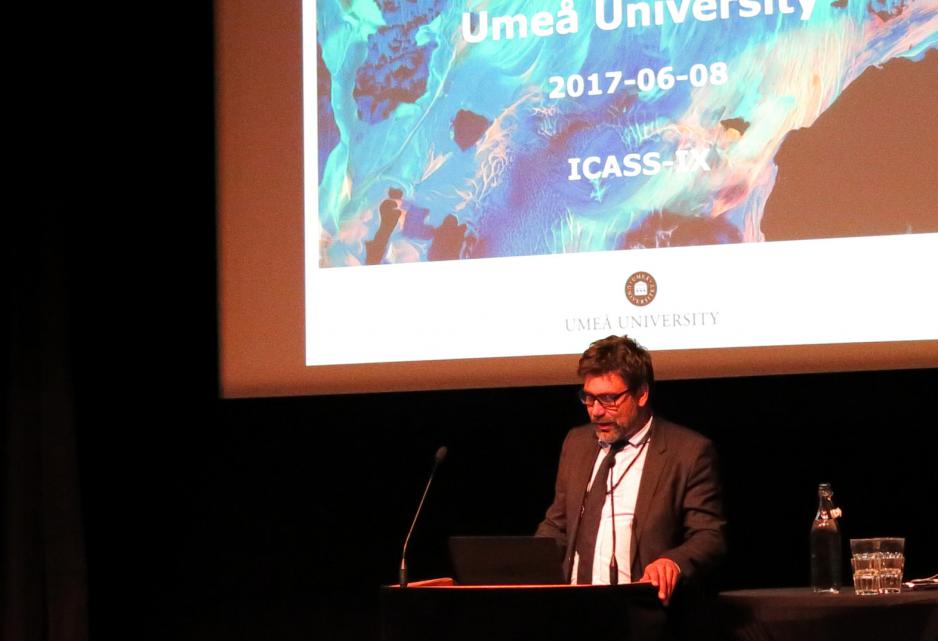Dealing with the Arctic means dealing with high politics

Andrés Jato, Swedish Senior Arctic Official of the Arctic Council, sees the Arctic in the middle of the global climate crisis in his welcome address to the ICASS IX Conference in Umeå. (Photo: Kathrin Stephen)
"The Arctic is in the realm of high politics", said Andrés Jato, the Swedish Arctic Official (SAO) at the Arctic Council last week at the opening session of the Ninth International Congress on Arctic Social Sciences (ICASS IX) in Umeå, Sweden. Climate change in the Arctic could even develop into a security crisis on a global scale, he added.
"The Arctic is in the realm of high politics", said Andrés Jato, the Swedish Arctic Official (SAO) at the Arctic Council last week at the opening session of the Ninth International Congress on Arctic Social Sciences (ICASS IX) in Umeå, Sweden. Climate change in the Arctic could even develop into a security crisis on a global scale, he added.
Mr Jato firmly put the Arctic into the realm of high politics in his welcome remarks, which range from climate change to security challenges. Because of this development, the Arctic has climbed high on the political agenda of many countries, including his own country Sweden. He also emphasized the urgency of tackling climate change in this connection:
"The climate crisis in the Arctic is not a future scenario; it is happening as we speak!"
Stronger ties with Asian countries
Jato called the US withdrawal from the Paris Agreement "regrettable and irresponsible", especially for the Arctic since the region is at the centre of the global climate crisis. The US decision reinforces the need for Arctic countries to foster their climate agenda and to build new alliances especially with Asian countries, the Swedish SAO said.
Also René Söderman, the Senior Arctic Official (SAO) of Finland, emphasised the global community’s efforts to work even harder given the new challenges. "The European Union especially will have to take the leading role in combatting climate change", Söderman said. The states in the US will be important players and partners in this endeavour, he added.
"Climate change is real and denial is not the answer", the Finnish SAO said.
Söderman also reminded the audience that climate change can be an economic opportunity through the development and deployment of green and renewable technology.
Close links between climate change and sustainable development
The Finnish SAO also emphasised the close link between climate change and the Sustainable Development Goals (SDGs). "The targets for climate change have to be met to reach any of the SDGs", Söderman explained. "We thus need to work very hard!"
Since climate change and sustainability are so closely connected in the sense that one cannot reach one without the other, the Finnish chairmanship of the Arctic Council has put both at the core of their chairmanship agenda for the next two years.
Arctic is about people
A recurring topic in Umeå was the role of people in Arctic politics and science. Swedish SAO Jato told the audience in the Universum building of Umeå University Campus that the Arctic is not a huge natural museum; it is mostly about people. Åsa Larsson-Blind, the President of the Saami Council, also stressed the importance of the focus on people, especially Indigenous peoples, in her welcome address. She emphasised that there has been an alienation of Indigenous peoples from the lands they have called their home for millennia.
Crucial role of scientific and traditional knowledge
"Swedish and Saami culture are very different", Ms Larsson-Blind reminded the audience. She also acknowledged progress has been made to connect Saami people to their homelands again. A crucial role is hereby played by knowledge, since knowledge builds societies, Larsson-Blind said. “Science is also vital for Saami culture and Saami research is important for Saami decision-makers to build Saami societies”, Ms Larsson-Blind explained.
Join knowledge forces and support science
The task ahead is to learn from different knowledge sources how to prepare best for a future with dramatic changes. "Making the best decisions needs the best science and traditional knowledge", the Saami Council President concluded. Mr Jato picked up on the importance of science for the Arctic’s future.
"Close cooperation and dialogue with science is necessary since we, the policy-makers, can’t make it without scientists", he said. Evidence-based science and political decisions are more important than ever before, he added, and politics need to step up their ambitions also in Arctic social sciences, next to investments in natural sciences and icebreaker capabilities.
The ICASS takes place every three years and is organized by the International Arctic Social Sciences Association (IASSA). The Congress in Umeå brought together 800 participants from all over the world for five days in the capital of Västerbotten County in northern Sweden. The next ICASS will take place in Arkhangelsk, Russia in 2020.
